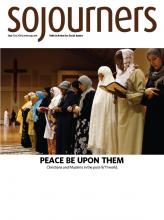Ten years ago, terrorists hijacked four airplanes over the United States. Two were flown into the World Trade Center in New York City, a third into the Pentagon, and the fourth was crashed into a field in rural Pennsylvania. By the latest count, 2,996 people died, including the 19 hijackers and 2,977 victims.
A few weeks after that tragedy, more than 4,000 religious leaders of all faiths signed a statement that was printed as an ad in The New York Times. We spoke of the moral response to terrorism: "We must not allow this terror to drive us away from being the people God has called us to be," the statement said. "We assert the vision of community, tolerance, compassion, justice, and the sacredness of human life, which lies at the heart of all our religious traditions. America must be a safe place for all our citizens in all their diversity. It is especially important that our citizens who share national origins, ethnicity, or religion with whoever attacked us are, themselves, protected among us."
On this 10th anniversary it is appropriate to ask what we have learned. How have we grown as a country? How have we healed, or how have we, in our hurt, turned around and hurt others? In two critical ways, we have shown that we did not learn the right lessons.
First, we have spent much of the past decade deeply engaged in two wars. Less than a month after the 9/11 attacks, President Bush began the bombing of Afghanistan, which was followed with U.S. troops. The stated objectives were to capture or kill al Qaeda and to overthrow the Taliban government. Al Qaeda was quickly dispersed, and the Taliban removed from power. Osama bin Laden was, of course, killed this spring, not by the war of occupation but with rigorous intelligence and special forces. Yet more than 100,000 U.S. troops continue to occupy the country.
Read the Full Article
